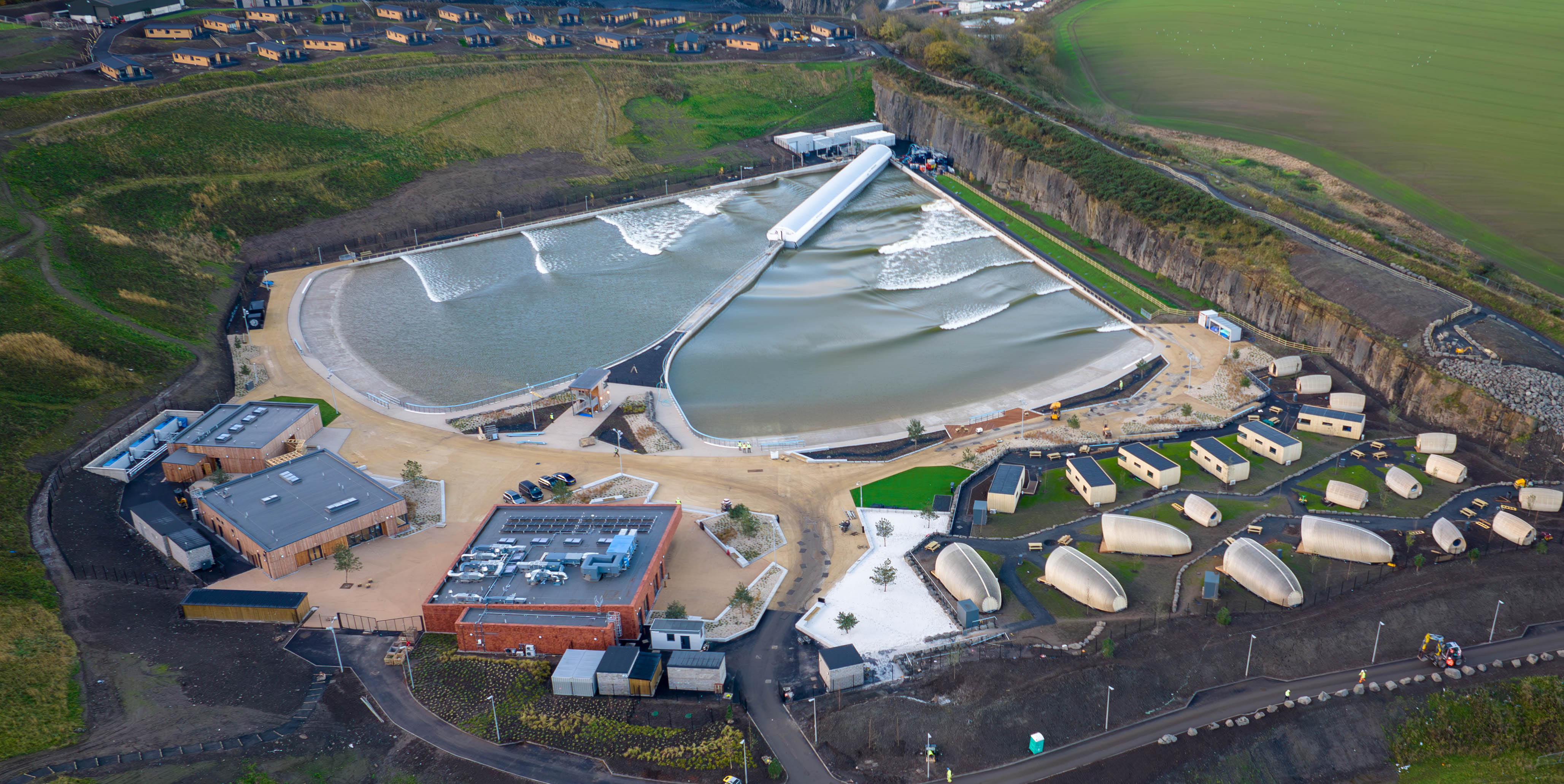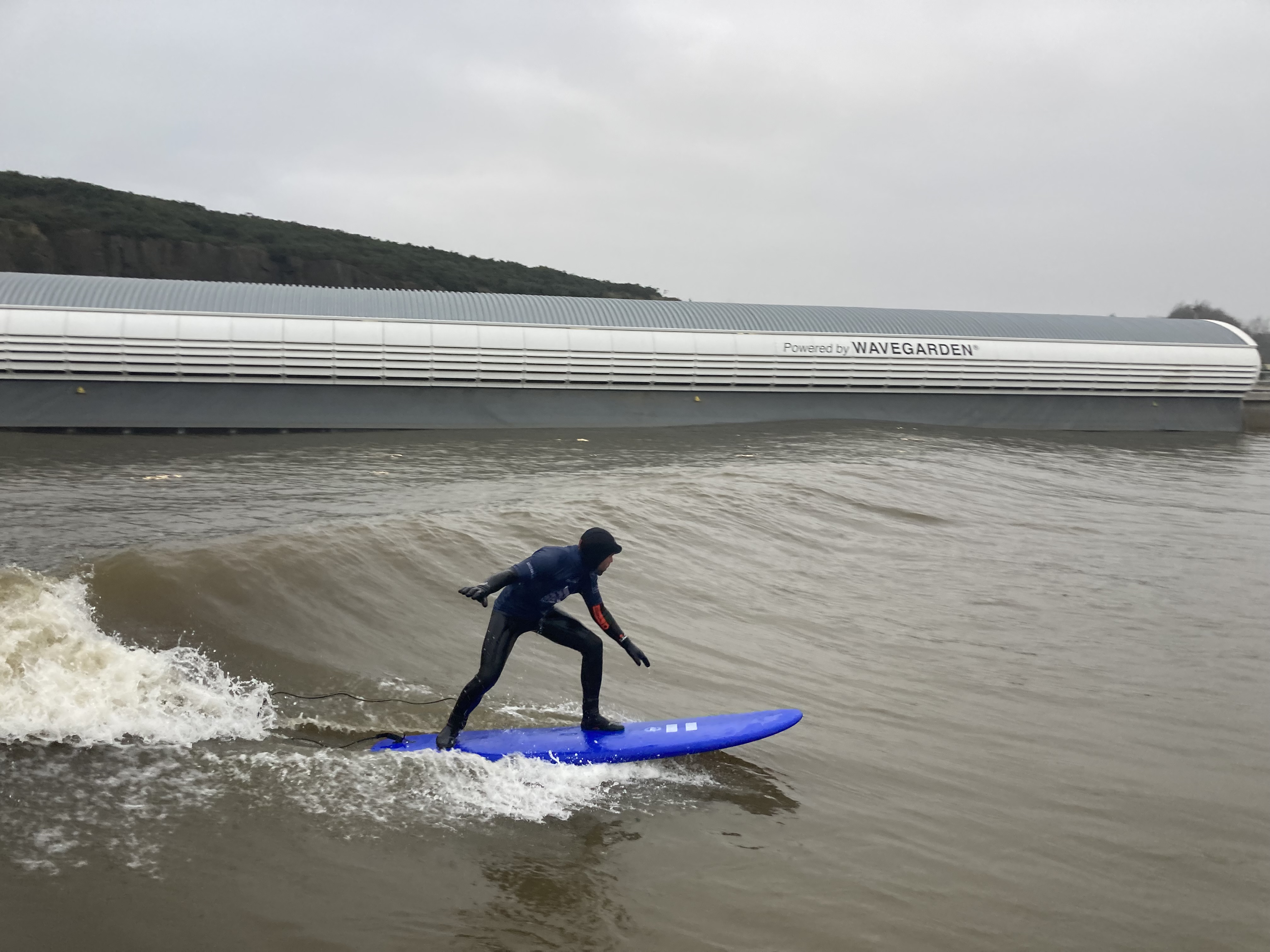The Editor’s Post: Riding Scotland’s community wealth building wave

How a new £60m leisure facility in Edinburgh sheds light on the Scottish government's community wealth building strategy. This week’s view from the Pioneers Post newsroom.
It’s not often I get to go surfing for work. So when Europe’s largest artificial surfing pool opened on Monday in Edinburgh, Scotland, it’s fair to say my level of stoke* was through the roof.
*Stoke – surfing slang used to describe excitement.
The Scottish National Investment Bank has invested £38.8m in the resort, called Lost Shore, as part of its mission to “enable regeneration that will improve the environment for local communities and create new job opportunities”.
Lost Shore doesn’t describe itself as a social enterprise, and the company’s impact and ESG manager, Alejandro Padró, is clear that any efforts to deliver positive impact must not be to the detriment of the commercial activities. “We are not ashamed of being a profitable business,” he said.
But Padró explained that the business is acutely aware of negative impacts it makes which are harder or impossible to mitigate, not least the energy use of the resort which includes 53 luxury visitor accommodation lodges and pods, a bar and restaurant and a wellness studio, not to mention the 160 metre-long wave pool.

He said: “We know that we are big. We use a lot of energy. We’re going to use a lot of resources. So we are not going to try to be something that we are not. We are not going to say ‘oh we are sustainable’. It’s a term that's been over-used and doesn't mean anything any more.”
Which isn’t to say Lost Shore isn’t working hard to minimise its environmental impact. Efforts include using the most sustainable wave-generating technology available (which consumes less energy than a single chairlift at a ski resort), developing new wetland, woodland and grassland habitats on site and powering the resort through a green energy tariff.
Beyond energy use, Lost Shore is working with the Scottish National Investment Bank to reach a ‘net positive’ balance. Initiatives on this front include partnerships with surf therapy and inclusive surfing charities, buying 650 plant-based wetsuits to rent out, and prioritising local procurement, from a seasonal rotation of Scottish restaurants to the firm which built the waterfront accommodation.
Padró is committed to ensuring Lost Shore maintains a high level of transparency. The business has been reporting on ESG metrics for more than two years and will continue to publish bi-annual impact reports with the support of the Scottish National Investment Bank.
Lost Shore has been built in a disused quarry in the community of Ratho, to the west of Edinburgh. The resort is expected to bring in more than 160,000 people a year, contribute £11m to the local economy and create more than 130 jobs.
The wave pool is vast – three times the size of Scotland’s national rugby pitch at Murrayfield – and can deliver up to 1,000 customisable waves every hour. Surfers are expected to catch 13 to 15 waves in the course of an hour-long session.
Even on the smallest setting, which I surfed, surfers will enjoy rides of more than 20 seconds. For context, the waves I caught were comfortably among the longest rides of my surfing life and 10 or more waves of that length in an hour is relentless. I’ll need to work on my fitness if I want to hit the target of 15.

Padró is keen for Lost Shore to be a “good neighbour” to Ratho and points to efforts to promote jobs locally, attend important community events in recent years and sponsor Ratho Athletic and Ratho United football clubs.
The quarry is also home to the Edinburgh International Climbing Arena (EICA), and it is estimated the two facilities will bring around 500,000 people to Ratho each year. There are currently no direct transport links to Ratho from Edinburgh city centre, just four miles away, meaning all of those 500,000 people are travelling by car.
For both the community of Ratho and Lost Shore and the EICA’s efforts to reduce their carbon footprints, the provision of a bus route would make a significant difference. Lost Shore is working with Ratho community council and Ratho bus working group to combine efforts to campaign for a bus link.
Listening to Padró outline the many elements of the resort’s impact and ESG efforts, it is clear to see a link between this major infrastructure project, ostensibly ‘just’ a leisure facility and tourist attraction, and the Scottish government’s push to implement a new model of economic development.

Last week I attended the Social Enterprise Summit Scotland, hosted by Social Enterprise Scotland. At the event Tom Arthur (pictured), minister for employment and investment, outlined the Scottish government’s vision for community wealth building.
Community wealth building is an economic model which seeks to redirect wealth back into local economies where it is generated, and places the control and benefits of that wealth into the hands of local people. Read more in my story outlining the key points of discussion at the Social Enterprise Summit Scotland.
Arthur emphasised the government sees social enterprise as being at the forefront of the rollout of community wealth building, both in terms of putting it into practice and in influencing mainstream business.
The government is committed to introducing a community wealth building bill soon. If it is successful, social enterprises and other businesses like Lost Shore may be just the start of a wave of economic systems change sweeping across the country’s economy.
Talking of surfing and pursuing economic systems change, this week my colleague Anna Patton interviewed Kieron Boyle, now chair of the Impact Investing Institute. Kieron described himself as “the country’s best surfer” – we can only hope he will pay a visit to Lost Shore in the near future to demonstrate his prowess.
This week's top stories
Pioneer Interviews: Kieron Boyle - ‘It’s a really hard job, but I’m in my happy place’
Expert Insight: Inclusive investing yields better repayments
The Impact World This Week: 14 November 2024
All images courtesy of Lost Shore

